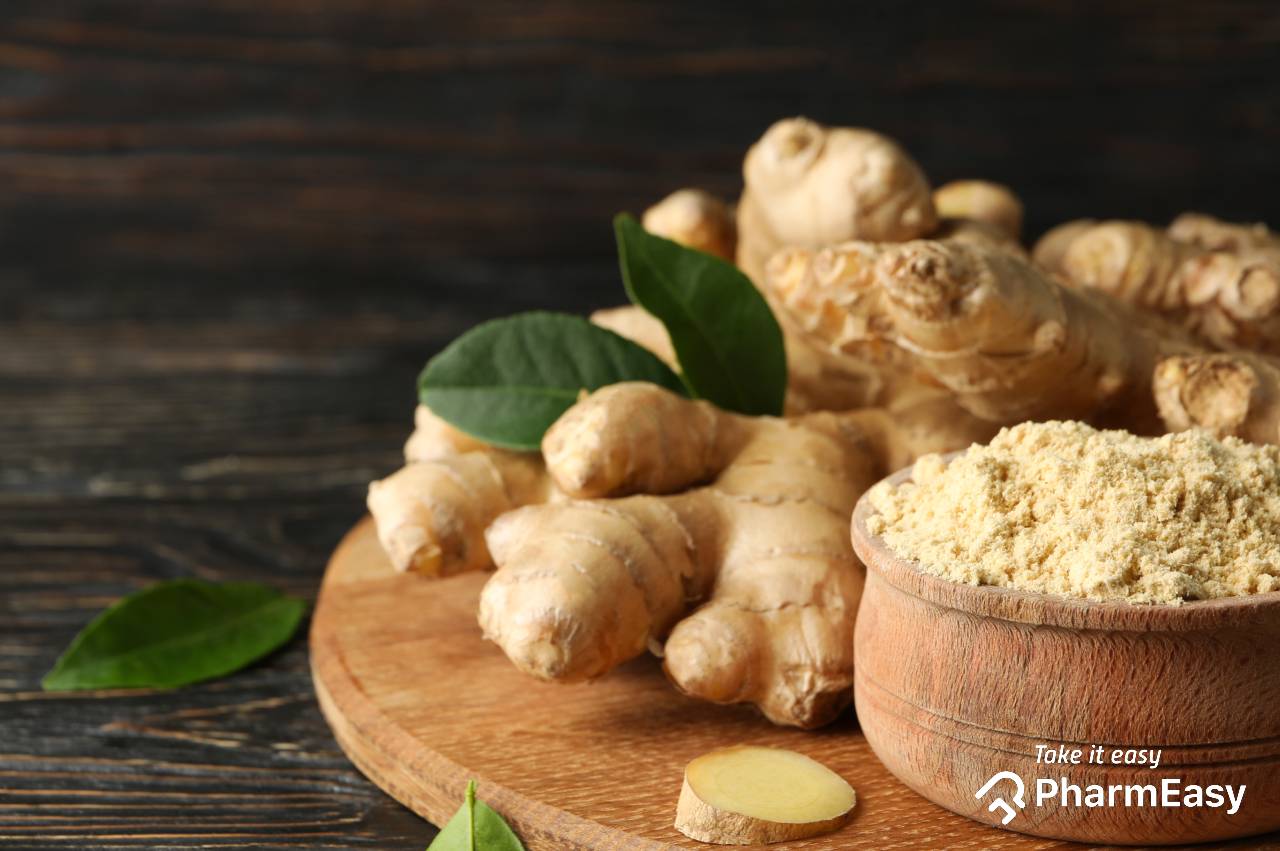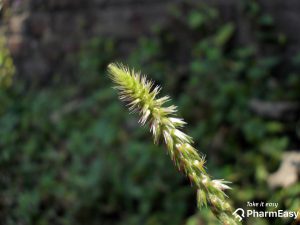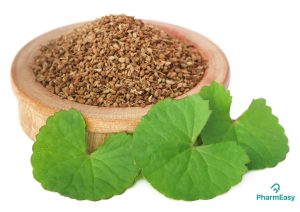
Zingiber officinale
Ginger and the winter season have the best equation. On cold morning days, a cup of ginger tea is an absolute pleasure to soothe your throat. Ginger is also known as Adarak in Hindi, is one of the healthiest spices on the earth. The ginger spice comes from the roots of the plant. Ginger is a plant with leafy stems and yellowish-green flowers.
Ginger is a perennial plant scientifically known as Zingiber officiale Roscoe. It belongs to the Zingiberaceae family contains essential oils and resins. It provides a specific odor and spicy flavor. It is a popular home remedy for nausea, stomach pain, and other health issues.
Table of Contents
Sources of Ginger:
Ginger has been used now for more than 2,500 years. This plant originated in Southeast Asia. It is cultivated now throughout the humid tropics, with India being the largest producer. Now it is growing in China, Japan, parts of South American, and Africa.
Nutritional facts of Ginger:
There are various nutrients present in ginger, such as proteins and minerals. 100 gram of fresh ginger contains-
| Components | Composition (per 100 g of fruit) |
| Calories | 80 |
| Total carbohydrates | 18 grams |
| Proteins | 1.8 grams |
| Total Fat | 0.8 grams |
| Dietary Fiber | 2 grams |
| Sugar | 1.7 grams |
| Protein | 1.8 grams |
| Calcium | 16.00 milligrams |
| Iron | 0.60 milligrams |
| Potassium | 415 milligrams |
| Niacin | 0.750 milligrams |
| Vitamin B6 | 0.160 milligram |
| Vitamin C | 5.0 milligram |
Health Benefits of Ginger:
Ginger may have various properties such as anti-inflammatory, antibacterial, anti-viral, and other healthful properties. Below are some benefits of ginger-
- May reduce nausea and vomiting:
Ginger is beneficial to reduce nausea and vomiting. It helps lower nausea through a direct effect on the stomach rather than on the central nervous system. Research suggests that ginger may help reduce nausea and vomiting caused by drugs used to treat HIV infection. It also treats nausea due to vertigo, nausea after surgery, and vomiting from chemotherapy.
A cup of hot ginger tea is the famous solution that may reduce your cough and cold instantly. The ginger contains compounds gingerol and shogaol may help fight off a cold because they can lower a fever, reduce pain, and suppress a cough.
Research suggests that ginger has a warm effect that may help reduce cold and cough symptoms. In 2013, the researcher concluded that fresh ginger beneficial for respiratory infections.
- May help with the weight loss:
Ginger has antioxidant properties that help reduce the free radicals in the body that may cause obesity. It contains gingerol and shogaol compounds that may contribute in various biological activities in the body. Research suggests that gingerol has anti-obesity properties that help food to digest faster and stimulate the body to speed digested food through the colon.
Ginger may help to reduce menstrual cramps by lowering the contractions of your uterus. According to the studies, taking ginger powder 500-2000 mg during the first 3-4 days of a menstrual cycle decreases pain in women and teens with painful menstrual periods.
- May ease the morning sickness:
Some studies suggest that consuming ginger during pregnancy may reduce the morning sickness symptoms such as nausea and vomiting. However, taking any herb or medication during pregnancy is a big decision. Before taking ginger, be sure to discuss the possible risks with your doctor.
In Ayurveda, ginger is a highly recommended hair growth treatment. It contains various minerals and fatty acids that help in hair thickening and encourages hair growth. Ginger also has natural antiseptic properties that help to prevent dandruff formation.
- May reduce joint pain:
Ginger contains anti-inflammatory properties that help to reduce joint pains like hip and knee joint pain.
Ginger tea benefits
Ginger tea is known as ginger water that is one of the best ways to get ginger benefits.
- Nausea and vomiting due to chemotherapy, after surgery, or anti-viral drugs
- Morning sickness
- Weight management
- Control normal blood sugar levels
- May give relief from pain
How to make ginger tea?
- Put the ginger root slices directly in a mug.
- Add the boiling water and allow it to steep for 5 to 10 minutes.
- Add honey for taste, if you want.
Ginger juice benefits
The spicy ginger juice packs a nutritional punch and can also serve as a valuable natural medicine.
How to extract ginger juice?
There are two methods to extract ginger juice. In the first method, grate the ginger finely with the help of a grater. Next, collect this grated ginger and put it into the cheesecloth, wrap it properly. Now squeeze it over an empty glass or bowl to collect all the juice.
In the other method, you can use a juicer or a mixer to extract ginger juice. Add small ginger pieces along with some water and blend. Then take out the ginger pieces and place them in a cheesecloth. Squeeze out the ginger juice for a drink. The benefits of ginger juice are as follows, including all the above benefits
- Improve digestion
- May reduce cough and cold
- May controls high blood pressure
- Help to remove bad breath
- Help to reduce acne and hair fall
Lemon- Honey-Ginger tea benefits
Lemon-honey-ginger tea is easy to make and has the best in benefits. It can be drunk warm, sweetened to your preference with a little honey, or pour over a tall glass of crushed ice for a refreshing, crisp drink. To make a Lemon-honey-ginger, take boiled water and add sliced ginger and lemon into it. Allow steeping for about 20 minutes. Strain. Serve warm or cold. Add honey if desired. The benefits of lemon ginger tea are as follows, including all the above benefits
- Control weight
- Improves Cognitive Functioning – improved memory Improve heart health
- Detox your body
Ginger oil
Ginger oil extracted from the ginger rhizome after a distillation process. Like other essential oils, it’s very concentrated. It beneficial when applying topically to the skin and hair with other mentioned benefits.
Dosing format and dosages of ginger
Ginger is available in the form of oral tablets, crystals, and powder. Also available in dried or fresh root tea.
Doctors recommend consuming a maximum of 3–4 grams of ginger extract per day. It is not advisable for children below the age of 2.
Side effects, warning, and toxicity of ginger
Ginger may cause mild heartburn and bloat due to its strong smell. When applying on the skin, it is relatively safe.
During pregnancy, the consumption of ginger is safe. However, some studies suggest that ginger might affect fetal sex hormones or increase the risk of having a stillborn baby. Hence, before using ginger during pregnancy, talk it over with your healthcare provider.
In a breastfeeding mother, no enough reliable information about the safety of taking ginger if you are breastfeeding.
Read more about: 8 Home Remedies For Seasonal Allergies
Disclaimer: The information provided here is for educational/awareness purposes only and is not intended to be a substitute for medical treatment by a healthcare professional and should not be relied upon to diagnose or treat any medical condition. The reader should consult a registered medical practitioner to determine the appropriateness of the information and before consuming any medication. PharmEasy does not provide any guarantee or warranty (express or implied) regarding the accuracy, adequacy, completeness, legality, reliability or usefulness of the information; and disclaims any liability arising thereof.
Links and product recommendations in the information provided here are advertisements of third-party products available on the website. PharmEasy does not make any representation on the accuracy or suitability of such products/services. Advertisements do not influence the editorial decisions or content. The information in this blog is subject to change without notice. The authors and administrators reserve the right to modify, add, or remove content without notification. It is your responsibility to review this disclaimer regularly for any changes.



 By
By 










Comments